
Queens of the Revolution is the filmmaker Rebecca Heidenberg‘s first feature film. It begins with the ritual of Ms. Cinthya dressing up for her performance at El Mejunje, a cultural center in Santa Clara, the capital of the Central Cuban province of Villa Clara. The city of Santa Clara, also known as Liberal City, has a revolutionary history and landmarks like Ernesto Che Guevara´s Mausoleum. The film has a Caribbean milieu that, at first, is reminiscent of Old Havana
El Mejunje, under the direction of Ramón Silverio, is a revolutionary cultural Project that influences the minds of the people, it is inspired by union, no matter the differences, instead of division. The place, like a fabled Phoenix, opened its doors in 1991, in a difficult time known as the Special Period (several years of economic crisis due to the downfall of the Soviet Union and the reinforcement of the US embargo). El Mejunje, an open área (a big patio) with trees surrounded by walls of stone, welcomes cultural diversity, literature, talks, visual arts, performing arts, and gastronomy. It is a meeting place for people of all ages to reaffirm their Cuban identity. El Mejunje is the place its visitors love and care for, in which everyone can come as they are. El Mejunje is a trench of ideas, a meeting place where each individual is respected, a community.
Through several testimonies, the viewer learns about the sexual diversity in the island and how the collective imagination of the community blends and digests the influences provided by Freddie Mercury, Whitney Houston, Montserrat Caballé, José José, Lola Flores, Olga Tañón and Isabel Pantoja, to name a few. The viewer also learns about adversities that Cubans have overcome, for instance, the Unidades Militares de Apoyo a la Producción (UMAP) created in 1965 as concentration camps to find a solution to the “problem” of Cuban homosexuals; years later, by 1986, HIV positives were locked up for years at Finca “Los Cocos” or “hospitals”. Juana Candela La Reina del penal remarks: I have been in prison for expressing what I am and feel; adding: “I am Queen Mother of Santa Clara and a little beyond”. The viewer also listens to the statement: if we add we are a multitude if we compare and subtract we become nothing.
What is interesting in the documentary is that the ones that talk are “children of the revolution”, they were born and raised under the Fidel Castro regime, and against all odds, they chose to stay on the island, nostalgia is for the ones that left.
The ones that stayed, living with little or nothing, are very skillful at solving problems to achieve their goals. They have evolved at the rhythm of drums and feel good about it. Socialism yes, homophobia no. In contrast, comes to mind the figure of queer writer Reinaldo Arenas, a Marielito, who left the island to live abroad.
 In contemporary Cuba intolerance and persecutions due to sexual preferences belong to the past, they have had a revolution in all the colors, celebrated more than 15 years of the Trans Cuba movement, introduced the concept of inclusion since school years, and there is even a strategy by the authorities to attract deep-pocketed gay tourists to the island.
In contemporary Cuba intolerance and persecutions due to sexual preferences belong to the past, they have had a revolution in all the colors, celebrated more than 15 years of the Trans Cuba movement, introduced the concept of inclusion since school years, and there is even a strategy by the authorities to attract deep-pocketed gay tourists to the island.
The selection of songs to lip-sync or listened to adds to the visual aesthetics of the film to provide an unforgettable experience full of force and authenticity. It also confirms the adverse life of trans persons globally, under socialism or capitalism, trans may be cared for by family and loved ones indoors but in the streets, the reality is aggressive and difficulties are numerous, to say the least. Ms. Cinthya loves her difficult world and puts an end to the documentary with a high note and tons of dignity.
The film is one not to be missed since it provides an insight into an institution in Santa Clara, Cuba, and the head high of the protagonists bearing their lives their way, a su manera. Aleluya!
To defend Cuban identity is what the revolution is about.
Review by José Mayorga Guatemala, Central America Lawyer and notary public, visual artist and editor of El Azar Cultural. Lives and works in Guatemala City. Cinema lover, curious about the possibilities life brings and eager to live the experience.

